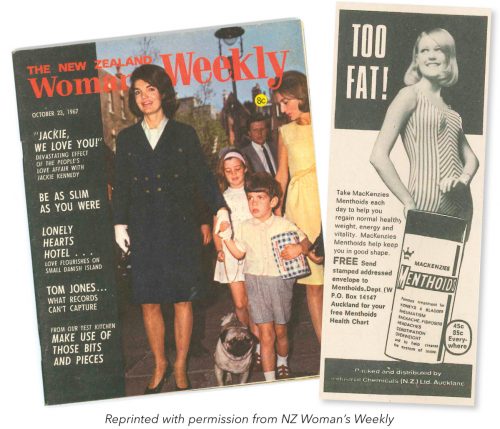
The 23 October 1967 issue of The New Zealand Woman’s Weekly is a great read. I think I prefer it to the women’s mags of today. There’s not much in the way of celebrity gossip, but lots of home hints, recipes, sewing and knitting patterns and some surprisingly good, non-fluffy articles.
The ads are also fascinating from this era. It’s interesting how advertising gives an insight into the aspirations of people at that time. It makes me wonder what future generations will be able to learn from our ads today.
Aspirations of people 50 years ago were not all that different from what some of us strive for today. They were, perhaps, a bit more frank about it than we are now. ‘Too fat!’ says the headline on one ad, beside a picture of a decidedly un-fat young woman. The ad goes on to promise that MacKenzies Menthoids pills will ‘help you regain normal healthy weight, energy and vitality’. The packaging also promises the pills will help with rheumatism, backache, headaches and constipation and ‘help cleanse the system of toxins’.
I don’t know what MacKenzies Menthoids contained, but we can probably assume they would not have been a magical cure all. But isn’t it interesting that faddish quick-fix things like this have been around such a long time, and are still around?
It’s around this time of year that we start to see the modern versions, you could say, of MacKenzies Menthoids popping up. Detox kits and juice cleanses promise much the same thing. Substitute ‘brain fog’ for rheumatism and throw in a few claims about feeling tired all the time and/or bloated, and you have the makings of a quick-fix solution, 2018-style.
It feels like we say this every year, but it’s not yet become redundant to say it: detoxes do not work. The science-ish sounding theories behind why detoxing or juice fasting supposedly work are pretty much your basic pseudoscience. Our bodies do not need to detox, unless we are poisoned or overdose on drugs. And there is zero scientific evidence to back up the theories behind detox kits and supplements. Experts say this over and over again, every summer.
Why then, is there still a market for these products?
I think it boils down to basic human nature. We are all attracted to the idea of a quick solution, even when we suspect, deep down, that it probably won’t work. The promise gets to us, even when we’ve been on diets before that haven’t worked.
Some of us, although we might not say it out loud, also like being told what to do. We like being told what to eat (or not eat), and when. And we like the idea of ‘rules’ about eating because it makes us feel like we are doing something serious. If we have to go through a little pain, we reason, there must be a reward at the end of it. Funnily enough, things that seem difficult to do are attractive.
There’s also, I believe, an element of exploitation going on. Perhaps the makers of the detox supplements, kits and programmes truly believe they’re doing it to help people. But I bet they also know that people are vulnerable, especially after a period of indulgence. And people are vulnerable when they’re feeling less than great about themselves. By making everyday states, tiredness, say, or bloating, into medical issues to be fixed, marketers can convince us to part with our money in the hope that this will be the thing that fixes us. Which, unfortunately, it never is.
So save your money and spend it on something with proven, positive, long-term benefits, such as vegetables and gorgeous summer fruit, instead of something negative and temporary like a detox.
www.healthyfood.com











